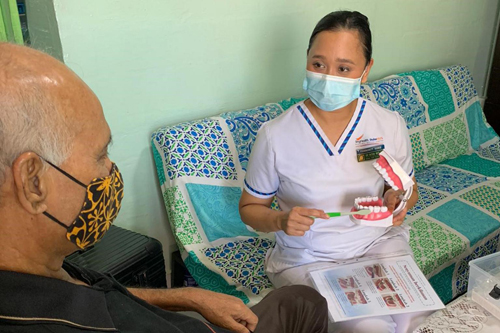SINGAPORE - As far as she can recall, Madam Lai Sow Fong has never visited the dentist in her life.
But it was not for a lack of dental issues. The 72-year-old cleaner had a sweet tooth when she was younger, and has over the years lost many of her teeth.
She now has a fighting chance of retaining the teeth she still has, after going for the first dental check-up in her life about two months ago at a community nurse post in Chinatown, where she works.
She is one of more than 90 people who have received free dental screening to date under a new pilot programme by the National Dental Centre Singapore (NDCS).
Called the Oral Health Movement 8020, the programme is so named because it hopes to help people here retain at least 20 of their natural teeth beyond the age of 80.
The programme's leader, Dr Chan Pei Yuan, a consultant at NDCS' Department of Restorative Dentistry, told The Straits Times on Thursday (July 8): "Research shows that if you have at least 20 teeth, you are still able to function; if you have less than that, you may need dentures or implants."
However, a 2016 study here found that only 9 per cent of the population aged 80 and above had at least 20 teeth left, while 30 per cent of those aged 60 and up did not have any teeth at all.
Adults have a full set of 32 teeth.
The most common reasons for people losing their teeth as they get older are tooth decay and gum disease, which are preventable with early intervention, said Dr Chan.
She said: "Many believe that tooth loss is inevitable as we age, but this is untrue. With proper oral hygiene and regular dental screening, it is possible to retain natural teeth into old age."
She added that tooth loss can contribute to oral frailty, or the decline of good oral function, and affect one's choice of food.
Those with extensive tooth loss tend to opt for food groups that are high in carbohydrates and fats, as opposed to meat, fruits and vegetables, which are more difficult to chew. This may lead to malnutrition and poor health.
Being orally frail or pre-frail, the stage preceding that, also increases one's risk of choking while eating or drinking.
As part of the programme, community nurses from Singapore General Hospital screen residents living in south-east Singapore, providing them with oral health education and encouraging good oral care habits to prevent further tooth loss.
In Madam Lai's case, this included being reminded to brush her teeth regularly and cut down on sweet treats.

Senior Staff Nurse Sri Ratina Wati Bte Abdul Razak teaching an elderly resident proper toothbrushing methods. PHOTO: SINGAPORE GENERAL HOSPITAL
Those identified as orally pre-frail or frail will be invited to take part in a prevention programme at NDCS.
In addition to further assessment and learning how to improve their oral health, participants may also be referred to dentists or speech therapists who will follow up on their condition.
These participants will be reviewed six months later to reassess their oral frailty status.
About one-third of those screened since the programme started in March have been found to be either orally frail or pre-frail.
The two-year programme aims to screen at least 500 Singaporeans aged 40 and above for oral frailty.
Dr Chan said this age group was selected to allow for early intervention.
She noted that while there are systems in place in Singapore to maintain oral health when a person is schooling, there is a gap from early to late adulthood. "During this period, if they neglect their oral health, they may be faced with decay and other dental issues, resulting in tooth loss by the time they reach 60 years old," she said.
She added: "Oral health is intricately linked with general health. As such, it is important that we maintain good oral health throughout life.
"Studies have shown that maintaining at least 20 natural teeth at the age of 80 and beyond will let you eat well, speak well and age well, thereby improving quality of life."
